First-Generation Stories
Our First-Generation Stories highlight the journeys of Georgia Southern students, faculty and staff who were the first in their families to attend college. Through their experiences, challenges, and triumphs, they inspire others to pursue their dreams and know they’re not alone.
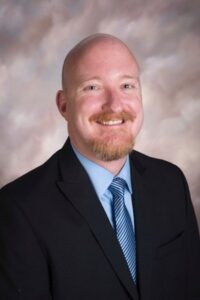
I am originally from Lehigh, KS — a town of 200 people surrounded by wheat fields in the heart of Kansas. I earned my undergraduate degree in Social Work from the University of Kansas, followed by a master’s degree in Higher Education Administration from NC State University. I later completed my doctorate in Educational Leadership at Georgia Southern University, graduating in Spring 2021.
What was it like being a first generation student?
My time at KU wasn’t bad. I was lucky enough to have a few people invest their time and energy into me to help me get through. My RA and Complex Director in housing invested their time. My academic advisor, whose name I still remember, helped me when I wanted to change my major and I didn’t know what to change it to. At that time the course catalog was an actual catalog, so I sat down and went through every major to see what would work for me. I was successful because of the connections I had through my being an RA in housing. If I had issues, they were able to connect me to the right places to get the help I needed. I never felt like giving up, but that was due in no small part to the encouragement and motivation I was getting from my mother. Growing up in a single parent family and after having seen my mother struggle working at the job she had, I knew that college was my way to ensure things would be better. Now this isn’t to say my life growing up was bad. My mother would agree that she worked so hard and kept me motivated so I could have a better life.
What kind of support did you receive from friends and family?
I couldn’t have done it without my mother. Even now, I am getting through my doctoral program and job with the motivation and encouragement of her.
What can Georgia Southern University do to help first Generation Students?
The critical thing is creating an environment where it’s ok to not know something and even sometimes not know what you don’t know. Navigating the bureaucracy of an organization continues to be more and more difficult, especially if you have never had someone that has done it before. We have to create an environment where it’s ok to not know something.
Give encouraging words to 1st Generation staff and students who haven’t realized their academic dreams.
Don’t give up…please don’t give up. There is ALWAYS someone here that can help you. Even if you don’t know where to begin, we can still help. You’re going to get discouraged and you’re going to feel defeated. That’s ok. What’s important is that you keep fighting and don’t give up on yourself. If you ever need anything, utilize your resources. Come and talk to me! I will do anything and everything I can to help.
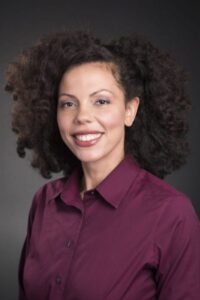
My name is Dr. Alicia Brunson. I am an assistant professor in the Sociology & Anthropology department. I am military kid so I am from everywhere and no where at the same time. My family retired in Junction City, KS. I completed my undergraduate degree at Kansas State University in psychology and American Ethnic Studies. I earned my Master’s and PhD from the University of North Texas in sociology and secondary concentration in film studies.
What was it like being a first generation student?
Being a first generation student is like jumping in the water not knowing how cold the water is or how deep it is. It is exciting, but anxiety provoking. I loved being in a place that I would grow and potentially allow me to have more opportunities.
Some problems that I encountered as an undergraduate was ensuring that I had enough money to cover tuition and books, rent, and food. I learned to stretch 25 cents into a dollar. During my senior year, I took 18 hours, worked 30 hours/week, and had an unpaid internship. I don’t know how I did it, but it made me realize that I will find a way with enough determination.
I also found it difficult to find a home at the university. I had a few close friends, but it never felt like I could just be me. It was a large predominately white university and I felt like I had to put on the right face to not be stereotyped as angry, lazy, or any other untruth. Learning what I had to go up against, made me strive harder to earn my degree and prove the naysayers wrong. I know that I didn’t reach my goals on my own. I was blessed to find mentors. One was the program director of a scholars program for first-generation and students of color. I found a place that valued my thoughts and abilities. Another mentor coached me into finding myself. He also encouraged me to purse graduate school. Both of these mentors reaffirmed that my life had purpose and not to give up although there were many times when I felt compelled to.
What kind of support did you receive from friends and family?
Although my family is not perfect by any means, my mom was my biggest supporter. She encouraged me whenever she could and even when she had no idea what I was doing. She called me frequently just to check in on me and tried her best to come to campus events I was involved in.
What can Georgia Southern University do to help first Generation Students?
I am conducting research on black student retention and graduation rates. I have found a few patterns. One is that students struggle because of financial concerns. Many students have to work, and in some cases support their families of origin financially. These commitments make time management very challenging for students, which then affects their academic performance.
Students also stated that they wish they had mentorship. Mentorship could come from upperclassmen and/or tenured faculty. This will help first-generation students by sharing stories and resources on how to navigate various issues that they may face.
Students also did not know where to go when they faced various problems. Campus tours should include information on financial aid services, tutoring and the Student Success Center, counseling services, multicultural student organizations, and health services.
Give encouraging words to 1st Generation staff and students who haven’t realized their academic dreams.
I know that it may seem like an impossibility attaining your college degree, but you will! You must know that you are perfectly capable, but you do not have to do it alone. Find your crew. Find friends who also have passion and determination to research their goals. Find that professor or staff person that listens and pushes you to grow. Ask question and ask for help. Grinding and striving doesn’t have to be what you have to do. Thrive during this time. Grow and reap your harvest with your community at your side.
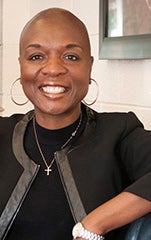
I am one of seven children born in a very small rural town in Arkansas called, Marvell. Neither of my parents made it past elementary school. I had three older siblings that had some public school but did not graduate from high school. The remaining four of the seven siblings, to include my self all went to college. Two of us have graduate degrees, one of my younger brothers has a bachelors and the other left college to join the Marine Corp.
What was it like being a first generation college student? What barriers did you face and how did you overcome them?
The closest my parents got to a college campus was attending a high school graduation at the local community college. My dad took me and my big sister to Orientation at the University of Arkansas in Fayetteville, AR. He dropped us and didn’t attend any of the meetings. I was so excited to go to college especially since my sister was there but more so to escape the poverty, I lived in. I spent the summer before my senior year of high school with my sister hiding out in her dormitory room! That was such a great experience, I didn’t want to go home. When I did return home, I realized there was a sort of sophistication needed if you were to be a successful “college student”! I just didn’t have it. I probably would not have returned for my freshman year had it not been for my sister who was then a Junior at the University of Arkansas. There were basic things she told me, but it was a little hard for me to navigate the “alphabet soup”!
What kind of support did you receive from friends and family?
My big sister was a huge support to me. Though I heard a few snickers from some students whose parents sent them allowances and goodie boxes, having her there meant a lot and made it much easier to bear. I felt bad that she had to go it alone but at the same time was relieved I had her to lean on.
What can GS do better in support of first Generation Students?
I believe we need to understand it’s no one department’s responsibility to support first generation students. The African proverb, “it takes a village” is so true in this instance. Each campus partner has to understand and help eliminate the barriers faced by the first generation student. If a student is having difficulty, we should take their experiences or the lack there of into consideration. Most of the time first generation students don’t know what they don’t know! We must be more patient with them and more understanding of their situations.
Give encouraging words to first Generation staff and students who haven’t realized their academic dreams.
My advice to first generation students would be to remember, if you made it here, you can make it here! You have some tools, use them! Take the time to fill your toolbox with any resource available to you. Ask questions of your peers, faculty and staff! “Iron sharpens iron”! This may require you step outside your comfort zone. The university is a safe place to fall but if you don’t reach out you won’t only fall, you will fail. Failing doesn’t make you a failure unless you choose to stay there! You must get up, dust yourself off, care for your wounds and P.U.S.H! Persist Understanding Stuff Happens!
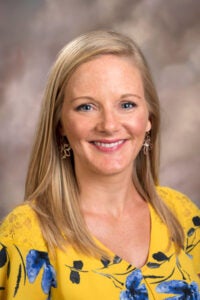
I was born to very young parents in rural Mississippi, an area in which higher education was not considered or highly valued. For much of my early life, I lived with my mom and grandparents and participated in a rural lifestyle that included farming, hunting, & fishing. When I was growing up, our family didn’t have a lot of money, but I’m lucky to have had food in my stomach and a roof over my head. There was no pre-K available in our area, so my first experience with school was kindergarten. While I know it sounds trite, I fell head over heels in love with school. I never left school, and consider myself fortunate to be able to come to school every day and lead my students as they pursue their goals.
What was it like being a first generation college student? What barriers did you face and how did you overcome them?
I attended Mississippi State University, and in 2004 I earned a Bachelor of Science in Biochemistry and Molecular Biology. It sounds so simple, right? The truth is that I struggled mightily to understand what resources were available to me, and I never came across a program such as TRIO. Not realizing that dropping a class was a possibility, I failed calculus and got a D in chemistry my first semester. I had always done well in school, but suddenly it was abundantly clear that I had no idea how to study: everything had always just come easy to me. One of my greatest college successes, in my opinion, was finding a tutor in the free math lab and spending two hours a day with him until I passed my calculus series. This was a painful process that taught me much about resilience.
My other big challenge in college was figuring out what to do with my degree once I earned it. Thankfully, I had two campus jobs working in research labs and knew that I enjoyed “doing science”. I looked up to my professors for their depth of knowledge and ability to convey it to a bunch of hapless 20-somethings. I reasoned that earning a PhD would allow me the opportunity to continue doing science and hopefully one day become a professor as well.
I entered the University of Alabama at Birmingham in 2004 as a PhD student in the Cellular and Molecular Biology program. My transition to graduate school was no easier than my transition to University life, but the resilience I learned as an undergraduate helped me to persevere. I exited the University of Alabama at Birmingham in 2010 with a PhD in Neurobiology and a fierce determination to ensure that my future students would be well-prepared for their next steps.
What kind of support did you receive from friends and family?
My mom has always been my biggest champion. When I was a pre-teen and my parents divorced, my mom earned an Associate’s Degree to better support our family. I remember riding in the car with her to school and calling out flashcards so she could study as a non-traditional student. It was then that I first thought of becoming a teacher, though I never thought that I would actually become a professor!
Whenever I felt discouraged, I remembered those days and how hard my mom had to work for her Associate’s while raising two kids alone. I called her many times during both my undergraduate and graduate days insisting that I couldn’t take another minute. She used a lot of tough love (sometimes really tough love!) to push me through. My mom and step-dad always told everyone how proud they were of me, so it would have been hard to let them down!
In addition, I made some of my longest-lasting friendships in graduate school, and that’s where I met my husband! At first I was intimidated by being around so many intelligent people who obviously came from families where a college education was commonplace. As I learned to trust those around me, they became a huge support as we all finished our graduate degrees together.
What can GS do better in support of first Generation Students?
First, I’ll say that students have so many resources at Georgia Southern, such as TRIO, the writing center, and the SMART tutoring center. In addition, these resources are easy to locate and to use. I do think that first-generation students are more hesitant to utilize these resources and might simply need encouragement! I have walked many students to the SMART center who were too nervous to walk in the door and try it out. Empowering students to use tools available to them doesn’t always have to be a huge thing; sometimes it’s as simple as a conversation and some encouragement to empower them to use their resources.
Give encouraging words to 1st Generation staff and students who haven’t realized their academic dreams.
I think it’s important for each person to have at least one mentor as they travel their academic journey, whether it is a professor, a family friend, tutor, or colleague. Further, I’d encourage everyone to define success for themselves, rather than letting someone else define it for them. Realize that your definition of success can change, and that it’s never ever too late to try something new.
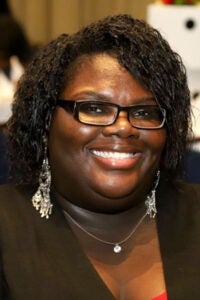
I am originally from the beautiful Windy City-Chicago, Illinois. Some of my most salient identities include being a woman of color, who is a first-generation college student, and a daughter of immigrants. I also come from a lower-socioeconomic upbringing. With this, I have always been told by my parents that they wanted me to “make it out.” It was hoped that I would be able to attend college and begin the process to start moving future generations of my family up the social class ladder. I earned my Bachelor of Science degree in Psychology in 2014 from Illinois College and my Master of Science degree in College Student Personal Administration in 2016 from Illinois State University. When I started college, I had a sense of pride that made me believe that I did not need help-I was going to be able to graduate all on my own. After not doing well in my Biology 101 class, which happened to be my major at the time, I quickly learned that I was mistaken. I joined the TRIO Student Support Services program in the spring semester of my freshmen year. That was one of the best decisions I made in my collegiate career. Seeking out that assistance truly saved me and I still credit the TRIO program with my success. It was because of the TRIO program that I decided to pursue my masters in higher education. It brings me true fulfillment to not only work in TRIO, but to have been able to be promoted up to the Director position after such a short time of working at Georgia Southern University. As a staff member, my favorite part of my job, and the part that keeps me going, is the opportunity to work with such great students and to be able-in a way-give back to an organization that has given me so much.
What was it like being a first-generation college student? What barriers did you face and how did you overcome them?
My biggest barrier I had to overcome in college was my pride. I had a mentality that I had made it to college by myself and because of that, I did not need the assistance of anyone else. It wasn’t until I failed two test in my Bio 101 course that I realized I had no idea what I was doing and that if I truly wanted to succeed, I was going to have to get some help. Even when I joined the TRIO program, it took me about a year to truly utilize the resources that the program had to offer. I was so convinced that even though I had join this incredible program that was there to provide guidance in the very areas that I was struggling with, that I could not be too needy. In my mind, if I had done too much, I was going to look as if I was not fit to be in college and ultimately be asked to leave the institution. It sounds crazy, but that’s what I had convinced myself of. It was my involvement in TRIO that allowed me to truly understand that there is never anything wrong with asking for help.
What kind of support did you receive from friends and family?
Although my parents have only an eight grade education, they have always been my biggest cheerleaders through my academic journey. As I mentioned before, they wanted me to “become something.” Because of this, they have always encouraged me whenever I had a thought to do something. Their only hope was for me to attend college. That was it really. But when I was close to graduating college and decided that I wanted to further my education by pursuing my masters, they were excited! I am pretty sure they were more excited than me. Even today, every few months, my mom will ask me “so uh…when are you going back to school? When will I get to call you Dr. Harris?” That has been such a huge relief. Even though they have no idea what it is that I do, or why I do it, they just know that education means a lot to me and they want to ensure that I am always working on the best version of myself.
What can GS do better in supporting first-generation students?
I believe that Georgia Southern has made a significant stride in providing support for first-generation students by having programs such as TRIO across all campuses. The TRIO programs already have a strong network of support from many different partners on campus. Continued understandings in all facets from all university constituents is a great way to support students.
Giving encouraging words to 1st generation staff and students who haven’t realized their academic dreams.
My advice to those who are first-generation is to never be too prideful to ask for help. There are so many resources around to help you succeed not only academically, but personally and professionally as well. I almost allowed my pride to get in my way during college, because I thought I could do it all myself. Get out of your own way and seek that additional assistance! The very thing you are running away from could be the very thing that you need to reach that next level.
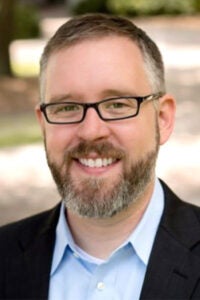
I am an assistant professor of sociology at Georgia Southern University. I earned my PhD from the University of Nebraska-Lincoln. I research how people make sense of social inequality. I was in the Upward Bound program while in high school and the McNair Program as an undergraduate. During grad school I worked for the UNL McNair Program and today I serve on the Georgia Southern McNair Advisory Board and mentor a McNair student.
Why was it like being a first-generation college student? What barriers did you face and how did you overcome them?
To be honest, while I was an undergraduate I didn’t really know that my experience was any different from anyone else’s. I assumed that everyone else was just as lost and confused as I was. I assumed everyone else was figuring out on the fly how higher education worked. I assumed everyone else thought their professors were far too important for me to interrupt them with my questions. At the time, I didn’t know what I didn’t know. It was only later, when I got into graduate school and then became faculty that I started to discover that everyone else didn’t struggle to understand the unwritten rules of higher ed.
As a first-generation student, I suffered from a lack of inherited wisdom. Unlike my 2nd generation peers who had parents who could advise and guide them through their undergraduate education, I had to figure things out on my own. And typically, I figured things out only after I had missed an important deadline or broken an unwritten rule.
What kind of support did you receive from friends and family?
My family and friends have always supported me throughout my academic career. They were always pulling for me to succeed. But one of the struggles of being a first generation student is the distance it can sometimes create between you and your family. I was having experiences and navigating through struggles that they couldn’t relate to from their own first-hand experience. At times, my academic journey was foreign to them. They loved me throughout and always tried their best to be what I needed, but sometimes I couldn’t express to them what I needed and they couldn’t relate to what I was experiencing. All that said, we figured out higher ed together. I would not be where I am today without their love and support. Whatever success I have had is a reflection of the family that I come from.
What can GS do better in supporting first-generation students?
Georgia Southern can continue to support TRiO programs. TRiO changed the course of my life and the lives of so many other first-generation students. In addition, Georgia Southern (and universities everywhere) can work to write down the unwritten rules of higher education.
Giving encouraging words to 1st generation staff and students who haven’t realized their academic dreams.
The academic paths many first-generation students take can be winding, with stops-and-starts, and occasional setbacks. It is okay if your educational experience is not like that of most of your peers. It is okay if you are not immediately successful. It is okay if you feel lost. None of those experiences mean you should drop out of school or that college isn’t for you.
Ask for help. Find mentorship wherever you can. Build relationships with other students who are committed to excelling academically. Have the audacity to dream big. Because a day will come when what makes you different, will be your competitive advantage.
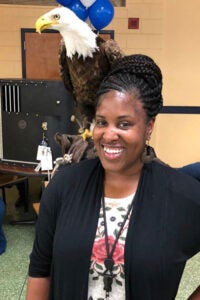
I am a Reference and Instruction Librarian at Lane Library. I started here in February of 2016 and have worked in libraries since 2005. I love being able to help students find the information they need, whether it is for their academic needs or personal lives. My involvement with TRIO started in the Upward Bound program at my high school. This program prepared me for college through counseling and college visit tours. I was also a TRIO student as an undergraduate at The University of North Carolina at Greensboro. The TRIO staff was like an extended family and I even became a peer mentor to freshman in the TRIO program.
What was it like being a first generation college student? What barriers did you face and how did you overcome them?
I always knew that I wanted to attend college. My mother and father instilled the value of education in me from a very young age. My mother taught me to read before I went to kindergarten and my father always expected us to do well in school. He learned a trade and even though he did not obtain a four year degree, he always had his own business. The barrier I faced was not from lack of support from my family but financial challenges of not being able to afford college. Because I worked very hard in school, I earned a full scholarship to attend college. I also learned to ask questions to be successful. Your parents can only show you what they have learned, so if they are unsure of when you should take your SATs, or when to apply for college, you have to speak up and ask for help. Being able to do that and participate in Upward Bound, helped me on my path to college.
What kind of support did you receive from friends and family?
My parents valued education so there was an expectation that their children would go to college and do more than they were able to do. I surrounded myself with peers who wanted to be successful in life so we pushed each other.
What can GS do better in support of first Generation Students?
Georgia Southern has taken a great step by offering TRIO Support Services to their students. In addition to offering support through TRIO, faculty should have an understanding of how to work with first-generation college students. All students have different needs so we all must be understanding of that in the classroom and in the library. It starts with finding out what the needs are and then working to fulfill those needs.
Give encouraging words to 1st Generation staff and students who haven’t realized their academic dreams.
You already have everything you need inside of you to succeed! If you need help, don’t be afraid to ask. Find someone on campus that you trust to help you navigate your college journey. Some things you will learn in class and other things you will learn from experience, so always be open to growth.
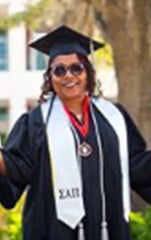
I was determined that I was going to get my bachelor’s degree. Not one of my siblings graduated from high school like I did. My mother only saw one child walk across a stage to get a diploma. One of my siblings received a State Issued Diploma. The others completed GEDs. I am happy for them as well because it means a lot when you get a completion certificate. It means a lot to me to do everything that I can do to make my mother proud of me. Finishing my degree at the age of 62 and studying with classmates young enough to be my grandchildren is a great accomplishment to me, especially when I study just as hard as they do. On top of all that I’m visually impaired. That doesn’t stop me! It means that I must work a little harder to maintain my GPA of 4.0. It’s dropped but never below a 3.2. I am now a senior and my journey has been amazing.
What was it like being a first generation college student? What barriers did you face and how did you overcome them?
My main barrier is my disability. It has been a struggle, but I wanted to prove it to myself that I can conquer it. I can say that the biggest support has been my 80-year-old mother. She is my Shero. She has shown me that nothing is to hard for God who have strengthened me to endure whatever got in my path of success and completion. I have dealt with instructors that said you need to think about changing your major because you need to be able to see better. I will never let the naysayers’ words control my decisions or actions which are stronger than their words.
What kind of support did you receive from friends and family? What can GS do better in support of first Generation Students?
Georgia Southern should continue to support programs like TRIO. So much is focused on the sports, the nursing program, the Education program, and other science program that they offer. First generation students are in those programs and the university should recognize those students that struggle just as hard if not more. First generation students deal with more obstacles because most of us are the first or only in our families to graduate from public school and college. Georgia Southern should focus on our struggles. I think sensitivity training for faculty dealing with first generation students that have taken the initiative to do better than what they have lived would be great. We are proud to attend post-secondary institutions. For the most part no one in our families have ever done this. We truly need the support and programs like TRIO need it also.
Give encouraging words to first Generation staff and students who haven’t realized their academic dreams.
What I can say to support those that walk the same path that I am walking is keep your head up. Never give up on what seems impossible. Always know that you are not alone. When you feel that you can not take another step or when you think that no one understands what you are going through remember that you have a strong university family behind you to help you along or through whatever you think is too difficult to accomplish. There have been many of times that I thought that I was alone and somebody I talked to in the TRIO lounge or in my class was going through the same struggle! Find folks in TRIO like Mrs. Jones, Ms. Willingham, Mrs. Schrantz, or even Mrs. Simmons.
I would like to share with you the poem that help me get through trying times:
When things go wrong,
as they sometimes will.
When the road you're trudging
seems all uphill.
When the funds are low,
and the debts are high.
And you want to smile
but you have to sigh…
When care is pressing you down a bit,
rest if you must, but
don't you quit.
– Author Anonymous
